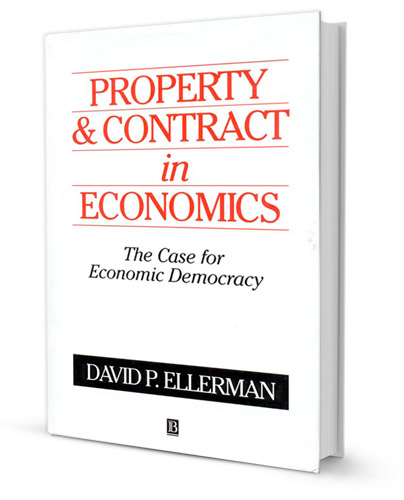 This book presents a modern version of the old Labor (or Natural Rights) Theory of Property and of an Inalienable Rights Theory that descends from the Reformation and Enlightenment. Together these theories re-solve the basic problem of distribution in the sense of giving a basis for the just appropriation of property and a basis for answering the question of who is to be the firm, e.g., the suppliers of share capital as in conventional capital, the government as in socialism, or the people who work in the firm as in the system of economic democracy (or labor-managed market economies). While these theories address old questions in economics, they do so in an entirely different manner than conventional economics which renders the questions as being about value or price theory (instead of about property rights and contracts). This book is now out of print and the rights have reverted to the author.
This book presents a modern version of the old Labor (or Natural Rights) Theory of Property and of an Inalienable Rights Theory that descends from the Reformation and Enlightenment. Together these theories re-solve the basic problem of distribution in the sense of giving a basis for the just appropriation of property and a basis for answering the question of who is to be the firm, e.g., the suppliers of share capital as in conventional capital, the government as in socialism, or the people who work in the firm as in the system of economic democracy (or labor-managed market economies). While these theories address old questions in economics, they do so in an entirely different manner than conventional economics which renders the questions as being about value or price theory (instead of about property rights and contracts). This book is now out of print and the rights have reverted to the author.
The following description of the book is excerpted from a pre-publication review by the late Professor Don Lavoie of the Economics Department of George Mason University.
“The book’s radical re-interpretation of property and contract is, I think, among the most powerful critiques of mainstream economics ever developed. It undermines the neoclassical way of thinking about property by articulating a theory of inalienable rights, and constructs out of this perspective a ‘labor theory of property’ which is as different from Marx’s labor theory of value as it is from neoclassicism. It traces roots of such ideas in some fascinating and largely forgotten strands of the history of economics. It draws attention to the question of ‘responsibility’ which neoclassicism has utterly lost sight of. It is startlingly fresh in its overall approach, and unusually well written in its presentation. …It constitutes a better case for its economic democracy viewpoint than anything else in the literature.”
TABLE OF CONTENTS
INTRODUCTION
PART I: PROPERTY
Chapter 1: The Fundamental Myth of Capitalist Property Rights
Chapter 2: The Appropriation of Property Rights
Chapter 3: The Labor Theory of Property
Chapter 4: Labor Theory of Property: Intellectual History
Chapter 5: Misinterpretations of the Labor Theory of Property
Part II: CONTRACT
Chapter 6: The Employer-Employee Relationship
Chapter 7: Non-Democratic Liberalism: The Hidden Intellectual History of Capitalism
Chapter 8: Contracts and Inalienable Rights
Chapter 9: An Intellectual History of Inalienable Rights Theory
Chapter 10: Misinterpretations of the De Facto Theory of Inalienable Rights
PART III: PROPERTY AND CONTRACT IN ECONOMICS
Chapter 11: Property Fallacies in Economics
Chapter 12: Marginal Productivity Theory
Chapter 13: Marxian Value Theory, MP Theory, and the Labor Theory of Property
Chapter 14: Fundamental Theorem of Property Theory
Chapter 15: Conclusions
Bibliography